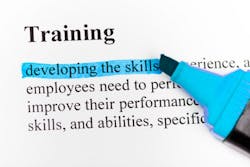Trained Techs, Successful Business
Shop owners have long known that training improves repair quality, but there hasn’t been a way to measure it. That has changed, thanks to the results of an I-CAR study release_notesd last fall. Repairers finally have a quantifiable metric to understand the long-term business impact of training, which I-CAR says is significant considering its data show that 69 percent of collision repair shops do not consistently train their staff.
“As the industry matures, it’s getting better about asking specific questions around business numbers. People want definitive numbers that are related to training impact,” says Jeff Peevy, senior director of field operations and segment development for I-CAR. “The industry has asked us to provide as much information as possible regarding the return on investment for training and how training can be directly linked to improved performance.”
I-CAR launched a six-month study—from September 2011 through February 2012—to uncover the correlation between training and shop performance. Participating shops improved several key performance indicators (KPIs), including touch time, cycle time, customer satisfaction and revenue.
For the study, I-CAR selected eight collision repair shops involved with its Professional Development Program (PDP). Each shop was a single location, independently owned operation generating $2 million in annual revenue. Each location also had similar business operations in place, such as methods for repairs and KPI measurement.
On average, the shops’ technicians had previously fulfilled roughly 30 percent of required training for ProLevel 1 within I-CAR’s PDP. The goal was to send technicians through a series of role-relevant training and work each location up to ProLevel 1 status over the course of the study.
There were a few key results. Peevy says communications and relationships among employees improved within each of the shops; they developed a better understanding of their expectations when jobs were handed off to the next department and “everybody gradually evolved to be on the same page.”
In addition, technicians developed better awareness regarding unknown information. They understood the need to gather all OEM repair information and data before starting on jobs, Peevy says, as opposed to making poor assumptions based on past knowledge. “They approach the repair much more ready with information.”
Quantitatively, those shop improvements contributed to improving several KPIs. Each of the shops studied improved touch time by 45 percent, cycle time by 14 percent and customer satisfaction scores by more than 5 percent. Half of the studied shops improved revenue by 5 percent, compared with the same month of the prior year; the other half improved by 10 percent.
“We don’t want to overestimate the findings from this initial study,” Peevy says. “However, it’s obvious to the people involved that constant training did have a positive influence throughout their organizations. These shops went from ordinary to extraordinary.”
“We’ve seen enough to be more convinced than ever that there is a direct correlation between consistent training and KPIs,” he adds. “We’re convinced of it, and this study shows it even more.”
Peevy says the study results were significant enough to warrant a deeper look into the issue. I-CAR is now conducting additional studies to develop statistically reliable assumptions. The new studies include larger levels of participation with other groups of multi-location and independent shops—both large and small.
CARSTAR is one of the MSOs included. Bob Keith, senior director of education and training for CARSTAR, says the results thus far are holding true within a group of CARSTAR locations in the Denver market that are working toward achieving I-CAR’s PDP ProLevel 1 status. He says the study is validating that training investments are extremely valuable for KPI improvement across the board, and there is a real value proposition in continued educational efforts.
Ongoing training and education can be expensive and time-consuming, which Peevy says causes some shops to put the effort on the back burner. But he says that mindset is why some shops are closing up.
I-CAR assessed all of the shops within its database and compared that with the shop locations that had closed. There were no closures among I-CAR’s Gold Class businesses, and no closures among another 20 percent of shops that practice training consistently.
Moving forward, Peevy says constant training will become more of a necessity for shops to remain in business. Vehicle redesigns and re-engineering will happen on roughly 80 models annually for the next three years—about 240 in all.
“In the coming years, shops that don’t train won’t be able to repair cars at all,” Peevy says.
